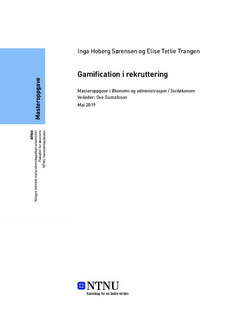| dc.contributor.advisor | Gustafsson, Ove | |
| dc.contributor.author | Trangen, Elise Tetlie | |
| dc.contributor.author | Sørensen, Inga Hoberg | |
| dc.date.accessioned | 2019-09-17T14:00:55Z | |
| dc.date.available | 2019-09-17T14:00:55Z | |
| dc.date.issued | 2019 | |
| dc.identifier.uri | http://hdl.handle.net/11250/2617283 | |
| dc.description.abstract | Temaet for denne avhandlingen er rekruttering og seleksjon av fremtidens ledere. Målet er å bidra til teknologisk utvikling innenfor feltet, ved å undersøke hvordan spillteknologi egner seg til å avdekke kompetanser som er viktig for morgendagens ledere. Studien benytter tre forskningsspørsmål:
Forskningsspørsmål 1: Gir gamification enkelte grupper bedre forutsetninger for å gjøre det godt i en rekrutteringsprosess?
Forskningsspørsmål 2: Gir gamification kandidater mulighet til å vise lederatferd i en realistisk setting?
Forskningsspørsmål 3: Oppfattes gamification av kandidater som et positivt tilskudd til rekrutteringsprosessen?
Disse forskningsspørsmålene er ment å besvare følgende problemstilling:
Kan gamification benyttes i seleksjon av morgendagens ledere?
Oppgavens tematiske og teoretiske grunnlag baserer seg på standard rekrutteringspraksis per i dag, generell ledelsesteori, Bartrams (2009) modell for lederkompetanser samt teori om gamification. Gjennom en flermetodisk casestudie har avhandlingen samlet inn data fra fire ulike kilder. Ved bruk av resultater oppnådd gjennom gamification, spørreskjema, dybdeintervjuer og sekundærdata har vi samlet inn empiri for å analysere problemstillingen som ligger til grunn.
Studiens resultater viser at gamification evner å være et objektivt seleksjonsverktøy. Faktorer som kjønn, alder og dataspillererfaring har ikke innvirkning på resultat oppnådd gjennom gamification. Studien viser derimot en signifikant korrelasjon mellom faktoren ledererfaring og oppnådd resultat gjennom gamification. Videre viser avhandlingen at gamification evner å hente ut lederkompetanser som anses som viktig å inneha av morgendagens ledere. Kandidatene opplever simulatoren som en realistisk fremstilling av en konkret arbeidssituasjon. Avslutningsvis viser empirien at gamification oppfattes som et positivt tilskudd til rekrutteringsprosessen og at kandidaten får et mer fordelaktig bilde av bedrifter som benytter seg av gamification i rekruttering. | |
| dc.description.abstract | This thesis examines the recruitment and selection of tomorrow's leaders. The purpose of this study is to contribute to technological development in this field by examining how game technology is suited to detect competencies which are important for the leaders of tomorrow. The study uses three research questions:
Research question 1: Does gamification give certain groups advantages that make them do well in a recruitment process?
Research question 2: Does gamification give candidates the opportunity to present leadership behavior in a realistic setting?
Research question 3: Is gamification perceived by candidates as a positive addition to the recruitment process?
These research questions are meant to answer the following thesis question:
Can gamification be used in selection of the leaders of tomorrow?
The thematic and theoretical basis of this paper focuses on today ́s standard recruitment practice, general leadership theory, Bartram ́s (2009) model for leadership competencies, and theories regarding gamification. The paper uses a multi methodical case study to gather data from four different sources. By using results achieved through gamification, survey, in-depth interviews and secondary data, the study gathered empirical evidence to analyze the thesis question.
The results of the study show that gamification is suited as an objective selection tool. Irrelevant factors such as gender, age and gaming experience does not affect the results achieved through gamification. Further on the study shows that gamification is able to detect leadership competencies that are considered important for the leaders of tomorrow. The candidates perceive the simulation as a realistic portraiture of a specific work situation. Finally, the results show that gamification is perceived as a positive supplement to the recruitment process, and that candidates consider companies that use gamification in a more favorable manner. | |
| dc.language | nob | |
| dc.publisher | NTNU | |
| dc.title | Gamification i rekruttering | |
| dc.type | Master thesis | |
